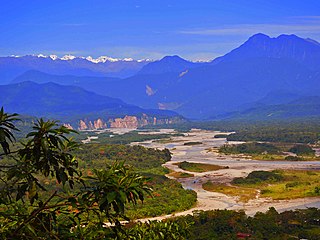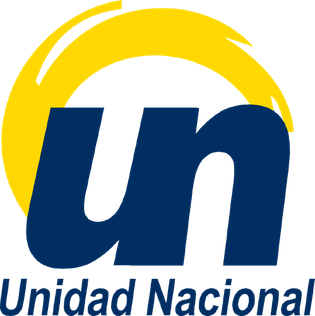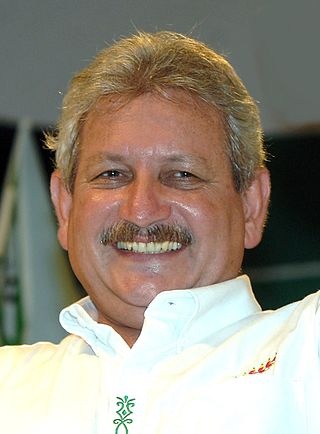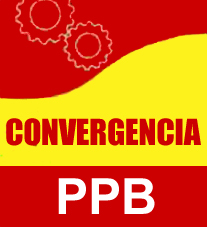
Cochabamba, from Quechua qucha or qhucha, meaning "lake", pampa meaning "plain", is one of the nine departments of Bolivia. It is known to be the "granary" of the country because of its variety of agricultural products from its geographical position. It has an area of 55,631 km2. Its population in the 2012 census was 1,758,143. Its capital is the city of Cochabamba, known as the "City of Eternal Spring" and "The Garden City" because of its spring-like temperatures all year.

Cochabamba is a city and municipality in central Bolivia in a valley in the Andes mountain range. It is the capital of the Cochabamba Department and the fourth largest city in Bolivia, with a population of 630,587 according to the 2012 Bolivian census. Its name is from a compound of the Quechua words qucha "lake" and pampa, "open plain." Residents of the city and the surrounding areas are commonly referred to as cochalas or, more formally, cochabambinos.
The New Republican Force is a center-right political party in Bolivia. It is mainly based in the department of Cochabamba.

The National Unity Front is a political party in Bolivia. It was founded in late 2003 by Samuel Jorge Doria Medina Auza, who had broken with the Revolutionary Left Movement earlier that year. It has 36 members of the Chamber of Deputies in the Plurinational Legislative Assembly. Despite its substantial share of the urban vote, and 16 former mayors, it does not control any city halls or governorships. The party is closely identified with Doria Medina's cement company Sociedad Boliviana de Cemento (Soboce).
Adriana Gil is a Bolivian political figure. She has been the party leader of Social Democratic Force (FSD), a movement which bills itself as a left-wing democratic alternative to the President Evo Morales's government.

Rubén Armando Costas Aguilera is a Bolivian politician and the prefect and then governor of Santa Cruz Department in Bolivia from 2006 to 2021, and also the leader of the Democrat Social Movement (MDS).
Social unrest in Cochabamba involved violent clashes between supporters and opponents of Cochabamba Prefect Manfred Reyes Villa in the departmental capital city of Cochabamba, Bolivia, reaching their peak on January 11 and 12, 2007. The policies of the President Evo Morales and the agenda of his Movement towards Socialism (MAS) party in the Constituent Assembly were opposed by politicians in other political parties, notably Reyes Villa. The prefect's opposition to Morales' policies angered the President's supporters, and early in 2007 demonstrations in Cochabamba escalated into violent clashes between Reyes Villa's civic movement and urban and rural social movements who called for his ouster. During the violence, coca farmer Juan Tica Colque and the young student Christian Urresti (17) were killed. Coca farmer Luciano Colque (48) was mortally wounded by blows from civic movement protesters and died of cranial trauma on February 27. Some 200 people were wounded in the clashes.

The Media Luna or Media Luna Ampliada refers to a group of four departments – Santa Cruz, Beni, Pando, and Tarija – in Bolivia which are home to a greater proportion of opponents to the national government led by Evo Morales and the Movement for Socialism (MAS) than the rest of the country. Pando has seen increasing support for MAS since 2009, while Tarija was initially supportive but has opposed MAS in every election after 2014. In contrast to the predominantly Indigenous Andean populations of the Andean region such as La Paz and Cochabamba, the departments in the Media Luna are majority mestizo, as well as being made up of the remaining 26 groups of lowland indigenes with white minorities, specifically in Santa Cruz de la Sierra.

The Bolivian Constituent Assembly, convened on August 6, 2006, in Sucre, with the purpose of drafting a new national constitution by December 14, 2007; extended from the original deadline of August 6, 2007. The Assembly approved the new Political Constitution of the State on 9 December 2007. It was put to a national referendum held on 25 January 2009, and went into force on 7 February 2009.

The Cochabamba Water War, also known as the Bolivian Water War, was a series of protests that took place in Cochabamba, Bolivia's fourth largest city, between December 1999 and April 2000 in response to the privatization of the city's municipal water supply company SEMAPA. The wave of demonstrations and police violence was described as a public uprising against water prices.

General elections were held in Bolivia on December 6, 2009, following a constitutional referendum held on 25 January 2009. The election was initially expected to be held in 2010. Voters elected:

Punata Municipality is the first municipal section of the Punata Province in the Cochabamba Department, Bolivia. Its capital is Punata. At the time of census 2001 the municipality had 26,140 inhabitants.

Plan Progress for Bolivia – National Convergence was a coalition that was Bolivia's largest national opposition political entity following the 2009 general elections. PPB-CN was a Bolivian political alliance of the right-wing formed in advance of the 2009 elections. The alliance was created at a meeting in La Paz's Zona Sur on 4 September 2009 by New Republican Force represented by Manfred Reyes Villa, Plan Progress for Bolivia, represented by José Luis Paredes, the former prefect of La Paz department; Autonomy for Bolivia led by Luis Alberto Serrate Middagh; Peoples Party led by Pablo Nicolás Camacho Bedregal; and the Nationalist Revolutionary Movement, led by Guillermo Bedregal Gutiérrez. However, the alliance did not continue to function in Bolivia's 2014 elections, and several of its elected senators stated in late 2013 that its role is ending.

Municipal elections were held in Bolivia, on December 5, 1999, in all 311 municipalities across the country. The elections marked a milestone in the continuous deterioration of the political influence of the traditional parties. In 23 municipalities the mayors were elected through direct popular vote, in other municipalities the mayors were elected by the respective municipal council.
Alejandro "Alejo" Véliz Lazo is a Bolivian politician and activist. He is a member of the ASP party. Véliz is a former executive secretary of the Federación Sindical Única de Trabajadores Campesinos de Cochabamba (FSUTCC), and former Secretary General of the Confederación Sindical Única de Trabajadores Campesinos de Bolivia (CSUTCB). In 2002 he concluded a political alliance with Manfred Reyes Villa and his New Republican Force.

Edmundo Novillo Aguilar is a Bolivian lawyer, politician, and Governor of Cochabamba. His political career includes serving on the Departmental Council, as Mayor of Totora, and as a Deputy in the Bolivian Chamber of Deputies. He was Presidents of the Chamber of Deputies for four years from 2006 to 2010. He is affiliated with the Movement for Socialism (MAS-IPSP), and was the first MAS-IPSP member to serve a President of the Chamber of Deputies.
Jorge Ledezma Cornejo is a Bolivian lawyer and politician affiliated with the Movement towards Socialism–Political Instrument for the Sovereignty of the Peoples. Ledezma served as a Deputy in the lower house of the Bolivian National Congress, representing circumscription 28, and as interim prefect of Cochabamba from December 2008 until 30 May 2010. He is currently Bolivia's ambassador to Peru. His career began as vice president of Cochabamba's Departmental Irrigation Users Federation in 1997; leader of the Mega (Sacaba) Association of Irrigation Users in 1998; and president of the Vigilance Committee of the Municipality of Sacaba in 1998. He then won public office as a councilman in Sacaba in 1999, followed by serving as the city's mayor in 2000-2001. His appointment to Prefect of Cochabamba was made by President Evo Morales following the 100-day tenure of Rafael Puente; the reasons for Puente's replacement are disputed.

The 2021 Bolivian regional elections were held on 7 March 2021. Departmental and municipal authorities were elected by an electorate of approximately 7 million people. This was the third regional election under the 2009 constitution. It was postponed from the expected date of 2020 due to the 2019 Bolivian political crisis and delays in holding the 2020 Bolivian general election. All elected authorities assumed office on 3 May.

Bernard Osvaldo Gutiérrez Sanz is a Bolivian lawyer, politician, and former television presenter who served as senator for Cochabamba from 2010 to 2014 and as a party-list member of the Chamber of Deputies from Cochabamba from 2015 to 2020.

Ana María Sempértegui Valdez is a Bolivian accountant and politician who served as a party-list member of the Chamber of Deputies from La Paz from 2010 to 2015.














